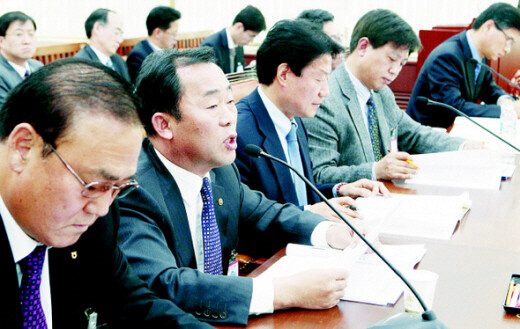hankyoreh
Links to other country sites 다른 나라 사이트 링크
KORUS FTA renegotiations shift significant losses to S.Korea

By Jung Eun-joo
The Lee Myung-bak administration claims they have resolved the balance of interests in the recent renegotiations of the South Korea-U.S. Free Trade Agreement (KORUS FTA) by arranging for benefits in the areas of pork and pharmaceuticals in exchange for concessions in the auto provisions. However, a look at the gains and losses for both sides shows that South Korea lost huge profits of up to 4 trillion Won ($3.5 billion), while the U.S. faces a loss of just 53 billion Won. In particular, USTR said Monday in a report posted on its Website that if the KORUS FTA take effect, the U.S. export to Korea will increase by 10 billion to 11 billion dollars and its trade deficit will decrease by 3.3 billion to 4.0 billion dollars.
In the agriculture sector, presented by the Lee administration as a leading example of favorable results, the timeline for abolishing tariffs on frozen pork from the United States was postponed to 2016 from the previous agreement’s Jan. 1, 2014. During the renegotiations, both countries agreed to lower their currently effective tariffs to 16 percent by 2012 and to reduce them by four percentage points each year after that until 2016. Given that U.S. pork imports amounted to $160.4 million for 2009, this means an additional loss of $25.66 million for the United States compared to the previous agreement, equivalent to around 29 billion Won.
But observers say the loss could decrease with U.S. beef imports increasing and U.S. pork imports dropping annually.
The two countries also agreed to a three-year postponement on obligatory approval-patent linkages in connection with marketing approval for generic pharmaceuticals. Within this system, the government notifies patent authorities of any seller request for generic medicine production. If the patent authorities raise objections, the approval authority cannot grant permission for the production until the patent dispute is resolved. An analysis by eleven state think tanks showed that a nine-month delay in marketing generic pharmaceuticals due to a patent dispute would incur a sales loss of 36.7 billion to 79.4 billion Won per year for domestic pharmaceutical companies.
The 2007 agreement text prevented referral for dispute resolution procedures for a period of one year and six month after the agreement took effect. In the renegotiations, introduction of the system itself was postponed for three years. For South Korean pharmaceutical companies, a three-year postponement would mean a reduction in their predicted losses by 110 billion to 238.2 billion Won, and a one-and-a-half-year postponement would reduce losses by 55 billion to 119.1 billion Won.
At the time of the 2007 KORUS FTA signing, the Korea Institute for Industrial Economics & Trade calculated economic effects of $860 billion in the auto sector, which was called the “area with the most benefits.” An immediate abolition of the 2.5 percent tariff on exports of South Korean cars to the U.S. was calculated as generating a profit of around one trillion Won in Korean money, as more than 90 percent of exports to the U.S. have displacement under 3000cc. A simple calculation shows that anticipated profits of four trillion Won disappeared with the postponement of tariff abolition for a full four years in the latest renegotiations. The loss does not factor in the reverse discrimination applied to domestic automakers as U.S. cars are exempted from meeting South Korean safety and environmental standards.
The difference is also clear when the scale of the two countries’ lost tariffs are calculated in terms of 2009 export and import amounts. Last year, domestic automakers paid $134.68 million in tariffs while exporting finished cars to the United States. This figure represents the application of a 2.5 percent tariff rate to exports of $5.39 billion. In contrast, domestic imports of U.S. autos amounted to $127.72 million, meaning just $5.1 million in tariffs paid to South Korea based on a 4 percent rate.
Please direct questions or comments to [englishhani@hani.co.kr]
Editorial・opinion
![[Column] Has Korea, too, crossed the Rubicon on China? [Column] Has Korea, too, crossed the Rubicon on China?](https://flexible.img.hani.co.kr/flexible/normal/500/300/imgdb/original/2024/0419/9317135153409185.jpg) [Column] Has Korea, too, crossed the Rubicon on China?
[Column] Has Korea, too, crossed the Rubicon on China?![[Correspondent’s column] In Japan’s alliance with US, echoes of its past alliances with UK [Correspondent’s column] In Japan’s alliance with US, echoes of its past alliances with UK](https://flexible.img.hani.co.kr/flexible/normal/500/300/imgdb/original/2024/0419/2317135166563519.jpg) [Correspondent’s column] In Japan’s alliance with US, echoes of its past alliances with UK
[Correspondent’s column] In Japan’s alliance with US, echoes of its past alliances with UK- [Editorial] Does Yoon think the Korean public is wrong?
- [Editorial] As it bolsters its alliance with US, Japan must be accountable for past
- [Guest essay] Amending the Constitution is Yoon’s key to leaving office in public’s good graces
- [Editorial] 10 years on, lessons of Sewol tragedy must never be forgotten
- [Column] A death blow to Korea’s prosecutor politics
- [Correspondent’s column] The US and the end of Japanese pacifism
- [Guest essay] How Korea turned its trainee doctors into monsters
- [Guest essay] As someone who helped forge Seoul-Moscow ties, their status today troubles me
Most viewed articles
- 1[Column] The clock is ticking for Korea’s first lady
- 2Hong Se-hwa, voice for tolerance whose memoir of exile touched a chord, dies at 76
- 3After 2 months of delayed, denied medical care, Koreans worry worst may be yet to come
- 4[Column] Has Korea, too, crossed the Rubicon on China?
- 5US overtakes China as Korea’s top export market, prompting trade sanction jitters
- 6Samsung barricades office as unionized workers strike for better conditions
- 7All eyes on Xiaomi after it pulls off EV that Apple couldn’t
- 8[Correspondent’s column] In Japan’s alliance with US, echoes of its past alliances with UK
- 975% of younger S. Koreans want to leave country
- 10[Correspondent’s column] The US and the end of Japanese pacifism